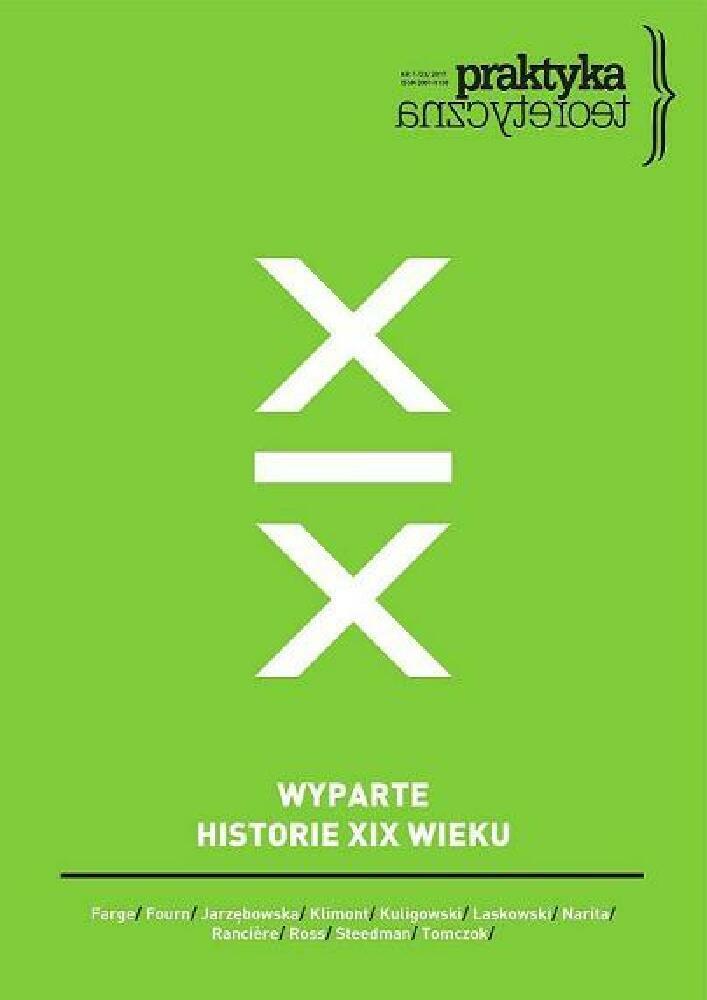Abstrakt
Artykuł stanowi zmodyfikowany fragment książki Kristin Ross poświęconej Komunie Paryskiej i Rimbaudowi. Autorka rozwija w nim trzy równoległe opowieści o konfliktach organizujących ówczesną literaturę, politykę i rozwijającą się pod koniec XIX wieku naukową geografię. Choć realizowany różnymi metodami, cel tych walk miałby być jednakowy i dotyczyć sposobu konstruowania przestrzeni. Jak przekonuje bowiem Ross, ideologiczne pojęcie przestrzeni (zgodnie z którym biernie oczekuje ona na podbój) zostaje wypracowane wspólnymi siłami przez antykomunardzkich polityków, elitarystycznych poetów parnasistowskich oraz ojców francuskiej akademickiej geografii. Rimbaud zaś (wespół z takimi radykałami jak Vermersch i Reclus) szkicował w swoich pracach taką koncepcję przestrzeni, w której nie będzie już miejsca na podbój, hierarchię czy charakterystyczne dla kapitalistycznego kolonializmu całkowite ujednolicenie rzeczywistości.
Bibliografia
Benjamin, Walter. 2006. „Rozmowy z Brechtem. Notatki svandborskie.” Tłum. Andrzej Kopacki. Literatura na Świecie 5–6.
Broc, Numa. 1974. „L’établissement de la géographie en France; diffusion, institutions, projets (1870 –1890).” Annales de géographie 83-459 (September-October): 545–568.
Depping, Guillaume. 1881. „Le Mouvement géographique.” Journal officiel de la République française 1.
Drapeyron, Ludovic. 1881. „Le But, la methode et l’oeuvre de la Revue de geographie.” Revue de géographie 9: 1–8.
Eisensweig, Uri. 1980. Territoires occupés de l’imaginaire juif: Essai sur l'espace sioniste. Paris: Christian Bourgoi.
Enzensberger, Hans. 1965. „Une théorie du tourisme.” W Culture ou mise en condition? Tłum. Bernard Lortholary. Paris: Julliard.
Giblin, Beatrice. 1978. „Le Paysage, le terrain et les géographes.” Hérodote 9: 74–89.
Gros, Jules. 1876. „La Mer Saharienne et le Capitaine Roudaire.” L’Exploration: Journal des conquêtes de la civilisation sur tous les points du globe 1: 220–224.
Hudson, Brian. 1977. „The New Geography and the New Imperialism: 1870–1918.” Antipode 9-2 (September): 12–19.
Jameson, Fredric. 1984. „Rimbaud and the Spatial Text.” W Re-writing Literary History, red. Tak-Wai Wong i M. Ackbar Abbas. Hong Kong: Hong Kong University Press, 66–93.
Koninck, Rodolphe de. 1984. „La Géographie critique.” W Les Concepts de la Géographie humaine, red. Antoine Bailly. Paris: Masson, 121–132.
Lacoste, Yves. 1979. „A bas Vidal... Viva Vidal !” Hérodote 16: 68–81.
Lacoste, Yves. 1982. La géographie, ça sert, d’abord, à faire la guerre. Paris: Maspero.
Levasseur, Emile. 1871. „L’Etude et l’enseignement de la géographie.” Séances et travaux de l’Académie des sciences morales et politiques 96.
de Lisle, Charles-Marie Leconte. 1978. Oeuvres diverses, tom. 4. Paris: Société d’édition.
McKay, Vernon. 1943. „Colonialism in the French Geographical Movement 1871–1881.” Geographical Review 33-2 (April): 214–232.
Murphy, Agnes. 1948. The Ideology of French Imperialism. Washington: Catholic University.
Picard, Ernest. 1877. Revue de géographie 1 (January-June): 1.
Reclus, Élisée. 1897. „Préface.” W F. Domela Nieuwenhuis, Le Socialisme en danger. Paris: Stock.
Reclus, Élisée. 1911. Correspondance, tom. 2. Paris: Schleicher.
Reclus, Élisée. 1982. L’Homme et la Terre. Paris: Maspero.
Rimbaud, Arthur. 1993. Wiersze: Sezon w piekle; Iluminacje; Listy, oprac. Artur Międzyrzecki. Kraków: Wydawnictwo Literackie
Santos, Milton. 1984. Pour une géographie nouvelle. Paris: Publisud.
„The Teaching of Geography Given by the Societies of Geography”. (1881). Bulletin de Bordeaux 4: 213–214.
Vermersch, Eugène. 187?. Les Hommes du jour. Paris: G. Towne.
Licencja
Autorzy:
„Praktyka Teoretyczna” jest pismem, które chce realizować idee wolnego dostępu do wiedzy i poszerzania domeny dobra wspólnego. Ma służyć rozwojowi nauki i krytycznej refleksji w Polsce i na świecie w imię idei wolnego dostępu do wiedzy (Open Access). Całe pismo jest udostępniane za darmo w Internecie na warunkach licencji CC-BY-NC-SA (Uznanie autorstwa-Użycie niekomercyjne-Na tych samych warunkach 4.0 Międzynarodowe) w wersji 4.0 (szczegółowe warunki: http://creativecommons.org/licenses/by-nc-sa/4.0/). Artykuły w nim zamieszczone mogą być dowolnie przechowywane, kopiowane, drukowane, rozpowszechniane i wykorzystywane do celów naukowo-dydaktycznych przy zachowaniu warunków licencji. Apelujemy tylko o uznanie autorstwa i podanie źródła w myśl przyjętych w środowisku naukowym standardów.
Nie ma natomiast możliwości komercyjnego wykorzystania zgromadzonych zasobów bez pisemnej zgody wydawcy. Dostęp do czasopisma nie może być dystrybuowany za opłatą czy w jakikolwiek inny sposób limitowany przez inne podmioty.
Autorzy tekstów przyjętych do publikacji w czasopiśmie „Praktyka Teoretyczna” są zobowiązani do wypełnienia, podpisania i odesłania na adres redakcji umowy o udzielenie nieodpłatnej licencji do utworów, z zobowiązaniem do udzielania sublicencji CC [PL.pdf, PL.doc, EN.pdf, EN.doc].
Zgodnie z umową, autorzy tekstów opublikowanych w czasopiśmie „Praktyka Teoretyczna” udzielają wydawcy czasopisma niewyłącznej i nieodpłatnej licencji oraz zezwalają na użycie sublicencji Creative Commons Uznanie autorstwa-Użycie niekomercyjne-Na tych samych warunkach 4.0 Międzynarodowe (CC-BY-NC-SA 4.0).
Autorzy zachowują prawa do dalszego, swobodnego rozporządzania utworem.
Autorzy nadsyłanych artykułów powinni upewnić się, czy wykorzystywane przez nich materiały nie są chronione prawami autorskimi na rzecz innych osób i ponoszą odpowiedzialność za ewentualne uchybienia w tym względzie.
